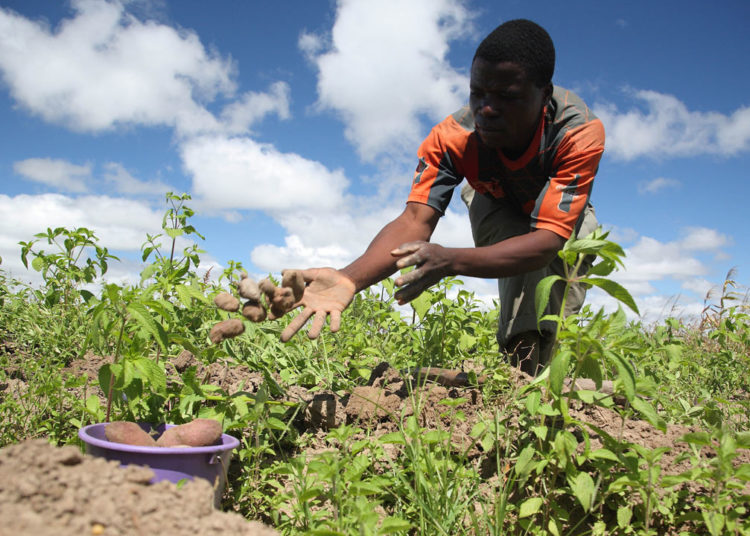The fallout from climate change and environmental degradation in Nigeria have left much negative impacts on farmers’ livelihoods and investments.
These challenges have become one of the most serious problems affecting agricultural sector output with lasting solution yet to be found by the experts.
However, experts in the sector have been advocating for building of farmers restoration mechanisms and resilience to shocks arising from disasters such as perennial flooding, persistent insecurity, desertification, soil erosion among others are very imperative to
Over the years, Nigerian farmers continue to lost billions of naira to the impact of climate change with less than one percent support from government in form of insurance and recovery plan.
Although climate change is a global challenge and in Nigeria the impact is largely felt by farmers whose farmlands are often washed away or submerged by floods and most of the government intervention through the National Emergency Management (NEMA) has shown to make insignificant impact compare to what farmers may have lost to natural disasters.
The 2022 Floods alone was responsible for billions of naira loss including over $15 million rice farm investment by the Olam farms in Nasarawa state.
According to Food and Agriculture Organisation (FAO) report, the poorest and most vulnerable populations are likely to experience the most severe impact of these shocks and with Nigeria landscape ecologically rich and diverse, with rainforests in the south and dry lands in the north, the challenges associated with climate change are not the same across the country.
FAO said, high levels of aridity, drought and desertification in the north are increasing vulnerability to climate change more so than in the south, thus affecting the livelihoods and income of smallholder farmers.
Between 2008 to 2022, 2.2 civilian flee their homes and an estimated $3.7 billion were lossed in agriculture due to conflict resulting from crop, livestock, destruction of irrigation and farming facilities and collapse of extension delivery system, while pro-longed drought alone accounted for about 6 percent of the losses.
In addition, annual average number of affected people by flood are 144,000 with most of them being smallerholders farmers where their livelihoods matter beyond relieve materials usually distributed by NEMA after flooding.
The more than 10-years-long escalating conflict in Adamawa, Borno, and Yobe have resulted in massive displacement of people, significant human, social and economic losses and food insecurity.
Similarly, the upsurge in banditry, farmer-herder conflict in the North-Central and kidnapping in the North West particularly in Katsina, Sokoto and Zamfara states has displaced many people and devastated agricultural livelihoods which constitute 90 percent in occupation of the people living in those regions.
Senior Special Assistant to the President on Agriculture, Office of the Vice President, Andrew Kwasari said Nigeria need to strengthen its institutions and constitution to provide more insurance coverage to smallholder holders farmers in a way to mitigate their vulnerability to shocks.
He said, “We are speaking about smallholder farmers, the people that invest their lives their livelihood, year in year out they do this, they are exposed to risks that is exposed to the hazards so, the exposure will definitely come the risks will always come but are there any mitigation? How are they covered? So to be specific, what is any guarantee or insurance offered to smallholder farmers?, there is not and don’t think in this country 1% of the smallholder farmers have regular insurance against their productivity year in year out.
So this vulnerability is not for lack of institutional arrangements. We have Nigerian Agricultural Insurance Corporation. It’s a big corporation. We have private insurance but we need to find the way to really develop these policies and offerings, so that it can suit the smallholder farmers and data has to be available”.
According to the Food and Agriculture Organisation (FAO) of the United Nations, Nigeria must work to build its farmers resilience to the shocks.
FAO deputy-director, office of emergencies and resilience, Shukri Ahmed while on visit to Nigeria recently said the support in the end is to make a difference in the life of those that are in the rural areas, mostly neglected smallholders farmers as he described the situation as a trying times.
He said, “As you know the shocks are increasing, and they are cascading, whether it’s climate relate, one time you talk about drought, then suddenly you are we are talking about floods, then there are displacements due to conflicts and these are compounding to impact on these poor farmers and FAO from the very beginning and its main mandate is eliminating hunger and eliminating poverty, but in a way that is sustainable and natural.
So this mission in particular is to work and bring the technical know how of FAO to support the government, we are bringing partners together to actually make a difference in the life of those downtrodden.
rather than managing disasters, these floods would come again, these droughts would come again, how can we prepare ourselves better to prevent the impact that they’re going to have on the vulnerable farmers”.





